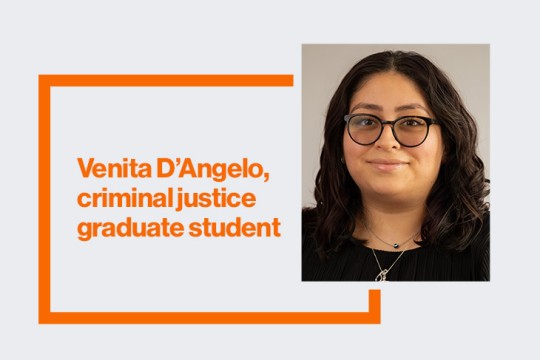Criminal Justice Master of Science Degree

Criminal Justice
Master of Science Degree
- RIT /
- Rochester Institute of Technology /
- Academics /
- Criminal Justice MS
Gain research, policy, and problem-solving skills to advance knowledge and practice in criminal justice.
Overview for Criminal Justice MS
Why Pursue an MS in Criminal Justice at RIT?
Multidisciplinary Approach: RIT's MS in criminal justice emphasizes the study of urban issues, public safety, and training in policy analysis and practice.
Career Readiness: Recent graduates have entered careers in prosecutorial investigation, criminal justice program evaluation, and crime analysis.
Preparation for Advanced Study: Students are well-prepared to pursue law degrees and doctoral degrees if they should choose to do so.
RIT’s criminal justice master’s degree fosters the creation of new knowledge through active research in agencies and the community. You will learn and apply problem-solving skills rooted in areas of individual interest with an emphasis on applied research. The master's of criminal justice enables graduates to enter successful careers in criminal justice agencies, policy analysis, or pursue further education in a criminal justice doctoral program.
The MS in criminal justice emphasizes a multidisciplinary approach to urban studies with a focus on public safety. The program stresses training in policy analysis and practice, particularly as it is relevant to the community and urban issues.
The master’s degree in criminal justice builds on a foundation of locally relevant policy research by providing you with the critical skills to carry out such work and the experience to assure success in employment or pursuit of further graduate studies. RIT’s criminal justice master's program provides you with a strong foundation in criminological, criminal justice theory, and social science research skills, enabling you to have a successful career in the policy analysis arena or to be prepared to pursue advanced study beyond the master's degree.
Recent graduates with a criminal justice master's degree have entered careers in prosecutorial investigation, criminal justice program evaluation, and crime analysis. Many have also pursued law degrees and doctoral degrees.
Students applying to the program should have a strong undergraduate foundation in criminology and research methods. Students who do not possess these skills may be required to complete additional undergraduate coursework (e.g., Criminology, Theories of Crime, and Research Methods) or demonstrate equivalent skills for completion of the degree.
-
Affordable Now. Valuable for Life.
Earn your master’s degree without the full price tag. With Master Up you can receive a 30% tuition scholarship for an RIT master’s degree.
-
Don't Delay Your Ambitions Until the Fall
This program offers a spring start, which means you can jumpstart your graduate journey and begin your studies this January.
-
Discover how graduate study at RIT can help further your career objectives.
On-Campus Open House | November 20
Virtual Admissions Webinars | Recordings Available
Virtual Academic Sessions | Recordings Available
Careers and Experiential Learning
Typical Job Titles
| Crime Data Analyst | Policy Analyst | Grant Manager/Writer |
| Lawyer | FBI Operational Support Technician | FBI Staff Operations Specialist |
| Advocacy Specialist |
Cooperative Education and Internships
What makes an RIT education exceptional? It’s the ability to complete relevant, hands-on career experience. At the graduate level, and paired with an advanced degree, cooperative education and internships give you the unparalleled credentials that truly set you apart. Learn more about graduate co-op and how it provides you with the career experience employers look for in their next top hires.
Co-ops and internships take your knowledge and turn it into know-how. A liberal arts co-op provides hands-on experience that enables you to apply your knowledge in professional settings while you make valuable connections between course work and real-world applications.
Cooperative education is strongly encouraged for graduate students in the criminal justice master’s degree.
Featured Work and Profiles
-
Criminal Justice 2025 Grad is a Change-Maker in Action
Criminal Justice 2025 Grad is a Change-Maker in Action ’25 For Sam Marino, the journey into criminal justice began with a book and a spark of curiosity. While in high school, she read "Just Mercy" by Bryan Stevenson as part of an AP class. The book's deep...
Read More about Criminal Justice 2025 Grad is a Change-Maker in Action -
Jane Research Fellowship Supports Crime Data Research with Powerful Impact for Rochester Region
Hayder Alhafedhi In the fight against a range of crimes from common theft to violent aggravated assault or murder, how do law enforcement agencies determine where to focus their resources for the most impact? Once a...
Read More about Jane Research Fellowship Supports Crime Data Research with Powerful Impact for Rochester Region -
RIT Alumna Thrives in Real Estate Law at Prestigious NYC Firm
After passing the New York state bar exam, Shakierah Smith became a real estate associate at Fried, Frank, Harris, Shriver & Jacobson, a law firm in New York known nationally for its...
Read More about RIT Alumna Thrives in Real Estate Law at Prestigious NYC Firm -
Spatial Data Analytics three-course electives sequence — entirely online
Offered entirely online, a new Spatial Data Analytics three-course electives sequence helps MS students build a critical skill set for today's criminal justice researchers.
Read More about Spatial Data Analytics three-course electives sequence — entirely online -
Empowering Change Through Research
Libnah Rodriguez, a dedicated research associate at RIT's Center for Public Safety Initiatives, combines her academic achievements in criminal justice with community-driven projects to tackle pressing...
Read More about Empowering Change Through Research -
Shakierah Shayonna Smith
“My greatest accomplishment is becoming a licensed attorney in New York State. As a first-generation student, I was naïve about the process of becoming an attorney…But I did all of this on my first...
Read More about Shakierah Shayonna Smith
Curriculum for 2025-2026 for Criminal Justice MS
Current Students: See Curriculum Requirements
Criminal Justice MS
The curriculum below outlines the typical course sequence(s) for this program.
| First Year | ||
|---|---|---|
| Fall | Hours | |
| CRIM-700 | Pro-Seminar in Criminal Justice Theory | 3 |
| CRIM-701 | Statistics | 3 |
| CRIM-702 | Pro-Seminar in Research Methods | 3 |
| Elective | 3 | |
| Hours | 12 | |
| Spring | ||
| CRIM-703 | Advanced Criminology | 3 |
| CRIM-704 | Crime, Justice and Community | 3 |
| CRIM-705 | Interventions and Change in Criminal Justice | 3 |
| Elective | 3 | |
| Hours | 12 | |
| Second Year | ||
| Fall | ||
| Select one of the following: | 6 | |
| Criminal Justice Capstone (plus 1 Elective ) | ||
| Thesis in Criminal Justice | ||
| Hours | 6 | |
| Total Hours | 30 | |
Criminal Justice Graduate Electives
Non-Criminal Justice Electives
Any of these courses can substitute for graduate program electives
| Code | Title | Hours |
|---|---|---|
| COMM-605 | Social Media Analytics and Research | 3 |
| COMM-717 | Artificial Intelligence and Communication | 3 |
| IGME-770 | Spatial Data Science | 3 |
| IGME-771 | Introduction To Geographic Information Systems | 3 |
| IGME-772 | Geographic Visualization | 3 |
| MGIS-650 | Introduction to Data Analytics and Business Intelligence | 3 |
| MGIS-725 | Data Management and Analytics | 3 |
| PSYC-716 | Graduate Social Psychology | 3 |
| PSYC-717 | Advanced Graduate Statistics | 3 |
| PUBL-609 | Public Management and Governance | 3 |
| PUBL-610 | Technological Innovation and Public Policy | 3 |
| PUBL-700 | Readings in Public Policy | 3 |
| PUBL-701 | Graduate Policy Analysis | 3 |
| PUBL-702 | Graduate Decision Analysis | 3 |
| STSO-750 | Graduate Sustainable Communities | 3 |
Criminal Justice Graduate Elective Tracks
Students may choose to complete a 9 credit hour elective concentration in one of the following tracks:
Spatial Data Analytics
Emerging Technology, Security, and Policy
Public Policy
Students are also interested in
Admissions and Financial Aid
This program is available on-campus only.
| Offered | Admit Term(s) | Application Deadline | STEM Designated |
|---|---|---|---|
| Full‑time | Fall or Spring | Rolling | No |
| Part‑time | Fall or Spring | Rolling | No |
Full-time study is 9+ semester credit hours. Part-time study is 1‑8 semester credit hours. International students requiring a visa to study at the RIT Rochester campus must study full‑time.
Application Details
To be considered for admission to the Criminal Justice MS program, candidates must fulfill the following requirements:
- Complete an online graduate application.
- Submit copies of official transcript(s) (in English) of all previously completed undergraduate and graduate course work, including any transfer credit earned.
- Hold a baccalaureate degree (or US equivalent) from an accredited university or college. A minimum cumulative GPA of 3.0 (or equivalent) is recommended.
- Submit a current resume or curriculum vitae.
- Submit a personal statement of educational objectives.
- Submit two letters of recommendation.
- Entrance exam requirements: None
- Submit one writing sample. This may be an example of your research, publications, project, or other scholarly written work.
- Submit English language test scores (TOEFL, IELTS, PTE Academic, etc.), if required. Details are below.
English Language Test Scores
International applicants whose native language is not English must submit one of the following official English language test scores. Some international applicants may be considered for an English test requirement waiver.
Duolingo (DET): 130
IELTS: 6.5
LanguageCert Academic: 74
PTE Academic: 60
TOEFL: 88
International students below the minimum requirement may be considered for conditional admission. Deaf and hard-of-hearing test takers with significant hearing loss do not need to take the listening and speaking sections for the TOEFL and IELTS. Each program requires balanced sub-scores when determining an applicant’s need for additional English language courses.
How to Apply Start or Manage Your Application
Cost and Financial Aid
An RIT graduate degree is an investment with lifelong returns. Graduate tuition varies by degree, the number of credits taken per semester, and delivery method. View the general cost of attendance or estimate the cost of your graduate degree.
A combination of sources can help fund your graduate degree. Learn how to fund your degree
Accreditation
Related News
-
March 28, 2025

RIT researchers use AI to uncover surprising trends in media coverage of police
A new study from RIT and Carnegie Mellon University experts is challenging a widely held belief about the media—that local news outlets have become more critical of the police in recent years.
-
December 10, 2024

Crime Analysis Centers Managed by RIT’s CPSI Helped Reduce Gun Violence, Earned Award
Two New York state crime analysis centers, managed by Rochester Institute of Technology’s Center for Public Safety Initiatives (CPSI), were recognized by the Bureau of Justice Assistance (BJA) earlier last month.
-
April 12, 2024

RIT graduate student gains experience through Center for Public Safety Initiatives
Venita D’Angelo, a graduate student pursuing a master’s degree in criminal justice, is working to reduce crime through program evaluation, data analytics, and project management services for area law enforcement, community nonprofits, and other criminal justice professionals.
Contact
- Delaney Ball
- Assistant Director
- Office of Graduate Admissions
- Enrollment Management
- 585‑475‑6933
- Delaney.Ball@rit.edu
- Tony Smith
- Associate Professor
- Department of Criminal Justice
- College of Liberal Arts
- 585‑475‑6532
- trsgcj@rit.edu
Department of Criminal Justice

























